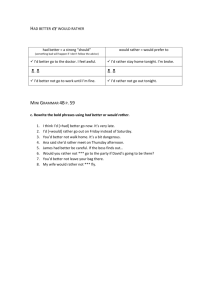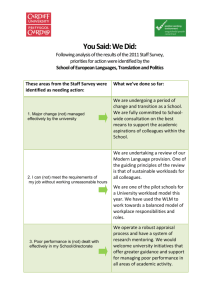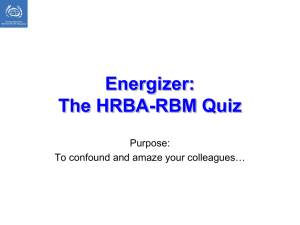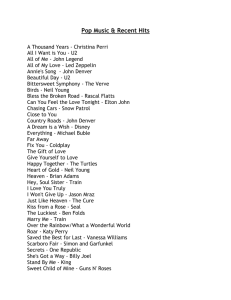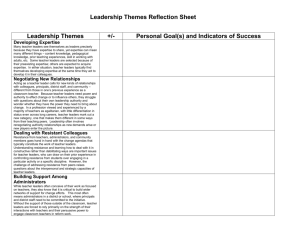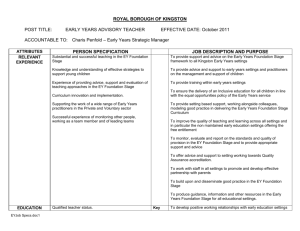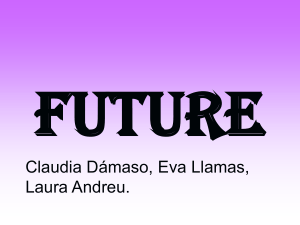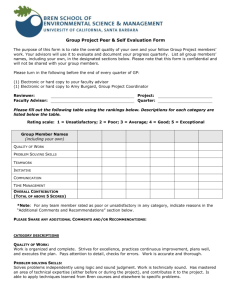Acceptance Speech for Award of Presidents Medal by Colin
advertisement
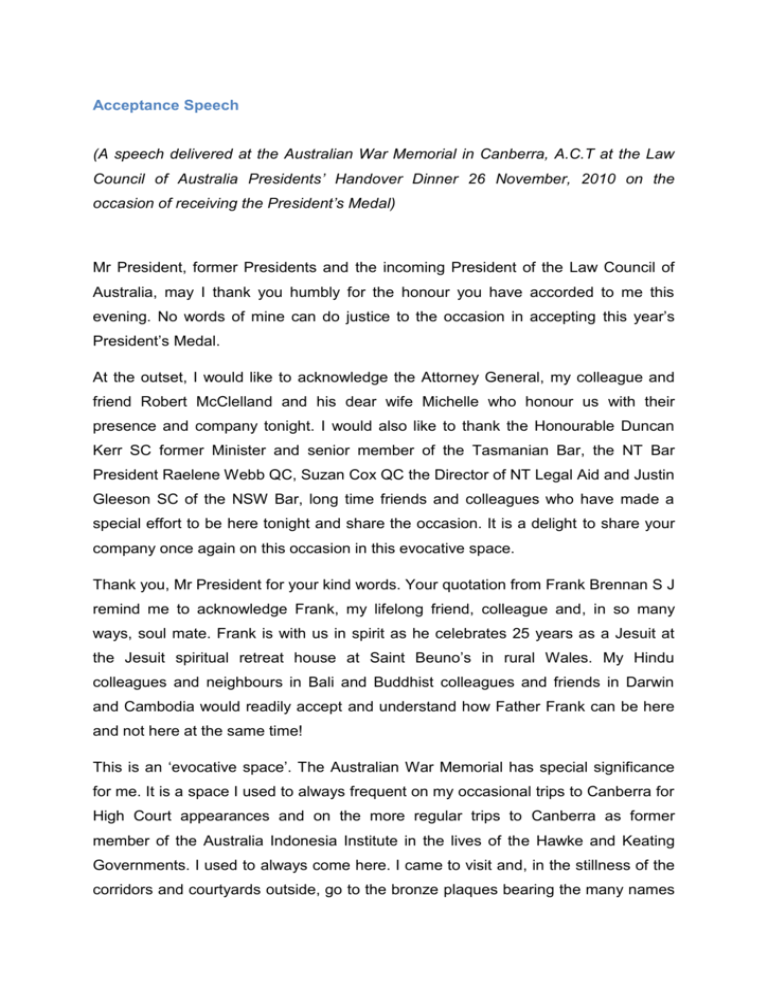
Acceptance Speech (A speech delivered at the Australian War Memorial in Canberra, A.C.T at the Law Council of Australia Presidents’ Handover Dinner 26 November, 2010 on the occasion of receiving the President’s Medal) Mr President, former Presidents and the incoming President of the Law Council of Australia, may I thank you humbly for the honour you have accorded to me this evening. No words of mine can do justice to the occasion in accepting this year’s President’s Medal. At the outset, I would like to acknowledge the Attorney General, my colleague and friend Robert McClelland and his dear wife Michelle who honour us with their presence and company tonight. I would also like to thank the Honourable Duncan Kerr SC former Minister and senior member of the Tasmanian Bar, the NT Bar President Raelene Webb QC, Suzan Cox QC the Director of NT Legal Aid and Justin Gleeson SC of the NSW Bar, long time friends and colleagues who have made a special effort to be here tonight and share the occasion. It is a delight to share your company once again on this occasion in this evocative space. Thank you, Mr President for your kind words. Your quotation from Frank Brennan S J remind me to acknowledge Frank, my lifelong friend, colleague and, in so many ways, soul mate. Frank is with us in spirit as he celebrates 25 years as a Jesuit at the Jesuit spiritual retreat house at Saint Beuno’s in rural Wales. My Hindu colleagues and neighbours in Bali and Buddhist colleagues and friends in Darwin and Cambodia would readily accept and understand how Father Frank can be here and not here at the same time! This is an ‘evocative space’. The Australian War Memorial has special significance for me. It is a space I used to always frequent on my occasional trips to Canberra for High Court appearances and on the more regular trips to Canberra as former member of the Australia Indonesia Institute in the lives of the Hawke and Keating Governments. I used to always come here. I came to visit and, in the stillness of the corridors and courtyards outside, go to the bronze plaques bearing the many names of those killed in action. Those names included the name of my uncle after whom I was named and who died aged 21 in the botched military operation which historians refer to as the massacre at Toll Plantation near Rabaul in Papua New Guinea. So tonight, I acknowledge my uncle and my late father and all those who dared mightily in fighting for the freedoms and democratic privileges we continue to enjoy in this free country. Lest we forget. In accepting this honour, I am alert to the sacrifice of others who have given so much. How pleased I am that my mother and my aunt (who experienced those times of war and insecurity) can be here with me tonight. There are no words a son can muster that can begin to express appreciation for the sacrifice of a good mother and a good father. Similarly, I would like to acknowledge the contribution and the inspiration of others who have given so much of themselves and who imparted the values and carried on the traditions vital to a healthy legal profession and to the administration of justice. I thank those who taught me both at school and at Melbourne University. I thank those who I worked with at Russell Kennedy & Cook Solicitors in Melbourne, to the late Justice Richard McGarvie, of the Victorian Supreme Court to whom I was fortunate indeed to be his Associate. My colleagues at the Bar deserve special mention. I thank my excellent Master at the Victorian Bar Frank Vincent QC and my colleagues at the Victorian, Northern Territory, Queensland and South Australian Bars. Life at the Bar is not easy, but I had a privileged 30 years at the Bar. I have lived and enjoyed practicing in a profession that is value driven. Adherence to the cab rank principle is one of the Bar’s contributions to a healthy democracy. Like so many others in this room I have known the pressures of criminal defence trials and the loneliness of decision making in murder trials. To all of my colleagues with whom I shared so many cases and who continue doing exacting cases, this medal is also yours. I salute you – fellow carriers of tradition and values. I could not be standing here tonight without also acknowledging the work of those who I have known for over 30 years who have worked in Aboriginal Legal Aid, Legal Aid and Refugee Services around the country. It has been my privilege to have been involved at the coalface for so many years in Aboriginal Refugee and Legal Aid cases. I also salute the foot soldiers out there who continue to strive for justice in the lives of Aboriginal people, poor Australians and asylum seekers. I know how difficult at times this work can be. Finally, I would like to express my admiration for our colleagues in Indonesia who have helped to establish to rule of law over the last decade in Indonesia. They have faced enormous challenges. I thank in particular our Indonesian colleagues who have acted for the members of the Bali 9 over the last five and a half years. The last review proceedings of the remaining three young Australians on death row await determination in the Supreme Court in Jakarta. I sincerely hope and pray the proceedings are successful. I look around this room tonight in this evocative space as we witness the importance of collegiality, of shared values and professionalism. In accepting this honour tonight, can I seek to reiterate the importance of our professionalism and traditions. Professionalism answers to higher values than business and individual gain and the consumer society, sourced as it is in a culture of complaint. We answer to higher values that I endorse tonight: service to the client who is more than a consumer and responsibility for complete and fearless candour in the Courts and among colleagues. The Law Council of Australia and all that it represents is an increasingly important force not just in the administration of justice, but in serving the values and the reality of a vibrant democracy. My recent experiences over the last two decades in Cambodia, Timor Leste and Indonesia indicate strongly that the Law Council of Australia does and will provide an increasingly important example to our colleagues in the region about professional organisation and development. May it quietly expand its regional role and influence. We are always rewarded when we look beyond ourselves. I have said enough. We have only the Now. Let us enjoy the Moment and each others’ company tonight and may we wish the incoming President well in his guidance of the Law Council of Australia over the next year. Thank you again Mr President. COLIN McDONALD QC
